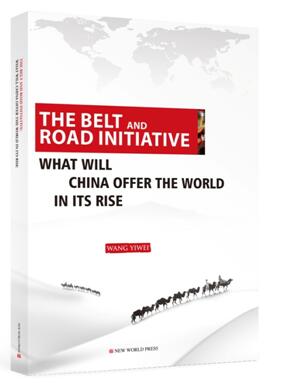A new style of globalization: the ‘Belt and Road’ initiative
 0 Comment(s)
0 Comment(s) Print
Print E-mail China.org.cn, April 28, 2016
E-mail China.org.cn, April 28, 2016
In his international bestselling book, “The World Is Flat”, American journalist Thomas L. Friedman viewed the world as a level playing field in the era of globalization. But to Chinese scholar Wang Yiwei, this may be the biggest illusion of our time. To him, we are living in a split global village as peoples and nations are divided geographically, economically, politically and culturally.
 |
In his new book "The Belt and Road Initiative: What Will China Offer the World in Its Rise," Wang argues for the unsustainability of the U.S.-dominated globalization and pointed out that the “Belt and Road” initiative proposed by China is a great solution to narrow the gaps, initiate a true and inclusive globalization and become the main theme of the 21st century.
As the first work in China to analyze the “Belt and Road” initiative from the perspective of international relations, Wang’s book has explained the value of the Silk Road Economic Belt and the 21st Century Maritime Silk Road and its influence on China’s relations with global major powers.
In his opinion, the “Belt and Road” initiative has opened a new chapter in the history of China’s all-round opening-up. Focusing on connectivity in the fields of policy communication, infrastructure connectivity, unimpeded trade, monetary circulation and understanding between peoples, the initiative marks China’s fundamental transformation from being a mere participant to a shaper of globalization, and that the situation is changing from one where China opens up to the outside world, to one where the world opens itself to China.
Moreover, through the connectivity among Europe, Africa, and Asia, this initiative will revive hinterland and marine civilizations, help developing countries shake off poverty, and promote the sustained and successful rise of emerging countries, so as to rectify the traditional logic of globalization.
Martin Albrow, a British sociologist and globalization specialist praised Wang’s book as a far reaching exploration of the significance of the “Belt and Road” initiative. He agreed with Wang that the initiative is China’s contribution to a new kind of co-existence and sustainable development, and an alternative to the old-style Western globalization. The initiative operates across economic, political, cultural, social and ecological sectors, while being based on a firm communications infrastructure.
He said that the book both challenges deep Western prejudices about China and offers others a future direction they cannot see for themselves. For example, Wang suggests to skeptical Europeans that the New Silk Road can reconcile Europe with Russia and make it both a Eurasian and Atlantic power. At the same time, he assures the United States that it will remain the world’s greatest maritime power.
The book, published by the New World Press, was launched on April 12 during this year’s London Book Fair. Recently, at the Munich Security Conference, the author sent this book to former United Nations General Secretary Kofi Annan, former Australian Prime Minister Kevin Rudd and other government officials.
The author Wang Yiwei is a professor with the School of International Studies, director of the Institute of International Affairs, Director of the Center for European Studies and a senior fellow at the Chongyang Institute for Financial Studies at Renmin University of China. He was a former diplomat with the Chinese Mission to the European Union and a professor at the Center for American Studies at Fudan University.






Go to Forum >>0 Comment(s)